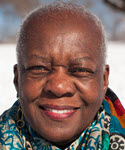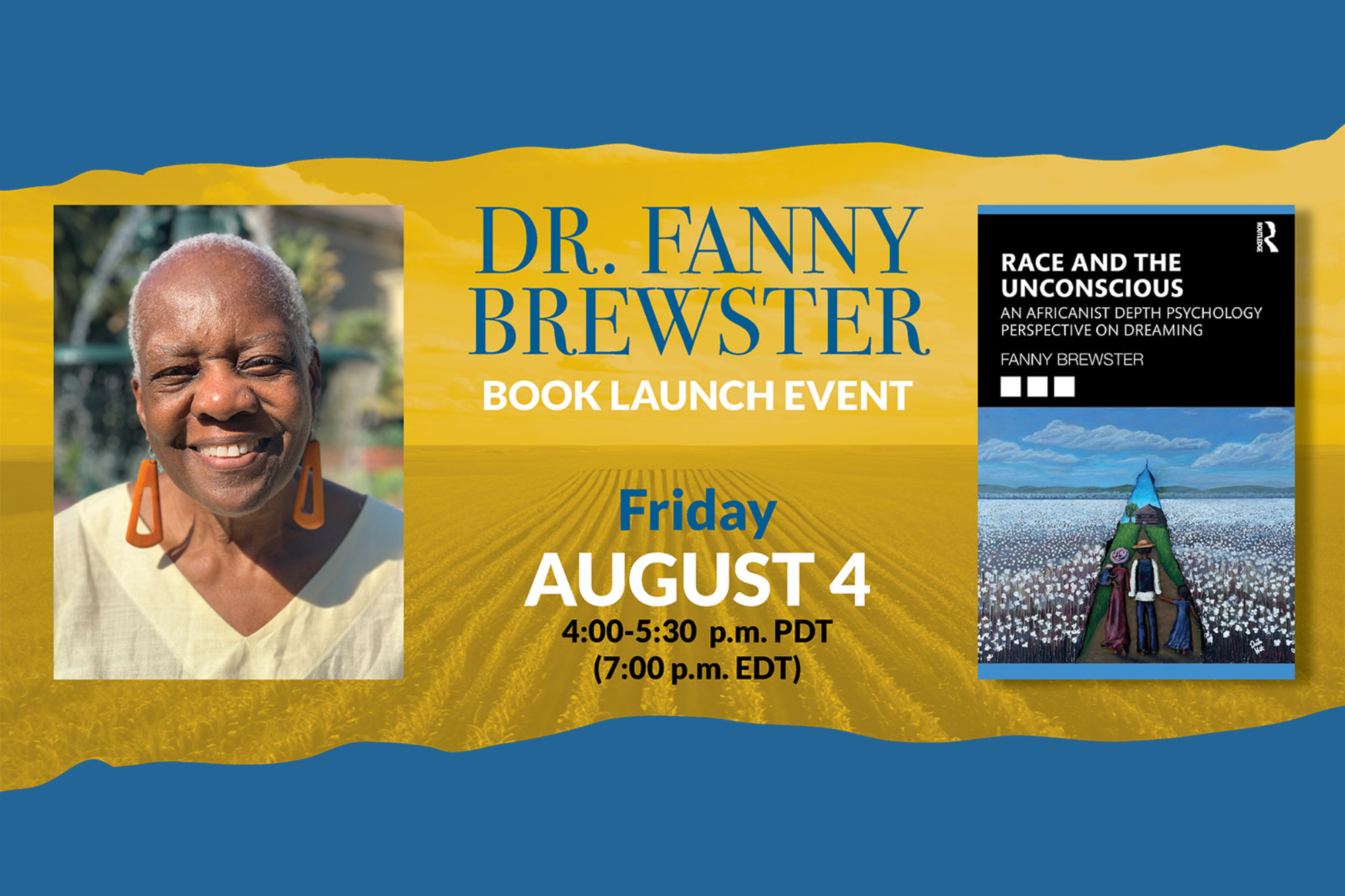Dr. Fanny Brewster, Ph.D., is the author of Race and the Unconscious: An Africanist Depth Psychology Perspective on Dreaming, as well as being a core faculty member of Pacifica Graduate Institute’s Depth Psychology with Specialization in Integrative Therapy and Healing Practices Program. She will be participating in the launch of her book on Friday, August 4, 4:00-5:30 p.m. PDT (7:00 p.m. EDT), via Zoom. To join the book event, please register here.
“Traditional African belief is that the conscious and the unconscious are joined together in most areas of life. The dream folds and unfolds into daily life. The conscious and the unconscious affect and react upon each other. The dreams that come forward carry one to a deeper place and to deeper meanings in the wake state life.” –Fanny Brewster, Ph.D.
Angela: Thank you for speaking with me today. You begin your book with the thesis that “African culture has a deep and long-abiding respect for dreams and dreaming.” But “African methods and beliefs about dreams and dreaming have gone mostly underreported in written form.” You take African mythology, philosophy, cultural rites, and social customs as the basis of the book, especially as regards “the significance of dream images, language, and states of conscious awareness present in Africanist dreaming.” Just reading these few sentences had an impact on me. Please tell us why dreams are the lens you chose for this book.
Dr. Brewster: This book was first created coming out of the work I did at Pacifica in my clinical psychology program. It was my dissertation and I did a yearlong study with three Africanist women, looking at their dreams, talking about their dreams, meeting with them. So this book was birthed from my experience at Pacifica. I’d come to Pacifica specially to study dreams, which I still find fascinating. I had teachers who let me go deep in all directions, including dreams, that I worked on through my first-year studies with Stephen Aizenstat. So the intellectual landscape was exceptionally rich, not just in dreams, and it felt like a dream to go there.
When I was at Pacifica, I would go into the bookstore, and into the library, and I used to talk with the bookstore person, who is now our librarian, Mark, all the time, and I would ask him, “Why aren’t there any books about black dreaming, African dreaming?” He would say, “They’re just not here.” And I thought, “They should be.” Years later, before working on the dissertation, it came to me that I should do my dissertation on black dreaming. That would be good to add to the library here. So it was looking at a part of a shadow, in terms of Depth Psychology literature that brought me to doing this particular writing about dreams. It was seeing that there was something missing that represents me and a lot of other folks. It’s not on the bookshelf and it should be. So that was partly how I came to it.
Angela: Chapter Three of your book is titled “Racism and Mythology: Separating the Two.” What is the relationship between racism and mythology that you’re addressing in this chapter and how does it relate to African dream work?
Dr. Brewster: Jung proposed that the collective unconscious is made up of archetypes and archetypal energy, and mythology is a part of that, the gods and goddess. It’s the collective unconscious in a way, a major part of how we understand stories and how we’re told stories, how we develop a personal myth for our own lives. So they’re all interwoven, and often times our dream life is an easy path to understand ourselves and have the archetypal energy appear. In the waking state, the archetypal energy possesses us and the ego can’t look as clearly at it. The dream life is the place where the archetype comes alive in a full way if we’re not too afraid of it.
One of the issues that I and others have looked at more recently in Jung’s work is how his theories were based on a hierarchical model with whites at the top and people of color at the bottom and how this was harmful in the beginning stages of developing America Jungian psychology. And a part of that was looking at the archetype as a negative once it showed up in people of color. That could only represent the shadow, according to Jung. So I think it’s important as we look at Jungian psychology to think about how we can come out of the 19th century model of colonialism that wasn’t respectful or unbiased toward people of color.
Angela: You describe African dream work as “a structurally organic group process, especially within the context of psychological healing. Family members and community participants are expected to join in with hearing and contributing to understanding dream images, words and locations.” You call this “social dreaming,” something that most in the United States are not familiar with. Can you talk about this a little more and how social dreaming, versus a dream that lives and dies in the nighttime memory of one person, informs you work?
Dr. Brewster: For me it shows up in the work I do with groups, letting me see how something is affecting each one of them and what it is saying about the collective. The dreams they put forward all go into a pot and all these things are being stirred together and it changes the flavor of what emerges. Like making jambalaya or chili, different ingredient are required. Social dreaming becomes that way of nurturance of the individual as well as cultural groups as well as the collective. It ripples out and from the group. I had an experience of that a few weeks ago in a dream group. Someone had a dream that was about fire, but it became more evocative when we thought about how we’re enflamed right now, with the fires in Canada, the heating up of the ocean and the planet. I think of social dreaming as rippling out from an individual conscious and being held in that communal space and reflecting what’s going on in the collective.
As part of the traditional healing practice in African and other indigenous societies, the dream belongs to the community. The way psychology was developed with a 1:1 analytical dyad, there’s an experience of not allowing for the bigger, broader group. Jungian psychology was not focused on groups. With that model, you don’t have the group experience, which comes out of an indigenous model, the idea that it takes a village, that the dream belongs to all of us.
My grandmother used to talk about her dreams, and my grandfather would ask who it was about. There were no therapists then, just family talking about the dreams. The family becomes the village, and in certain communities in the United States, people are getting together with intention and rituality for healing. I’d like to have us move toward that and I’m trying to develop that more in group dreaming, so we can create the rippling effect of the dream of one person creating a family out of the group. Often times, we can’t be with our own biological families, so the idea is to have a good model of extended families and we saw that a lot in communal living in the 60s, buying land together, living together, and having family/community.
Angela: Aside from your writing and teaching career, you also serve as the head of Pacifica’s Diversity & Inclusion Council. How do you see the study and practice of Depth Psychology evolving as it relates to diversity in the field? Why is this crucial to our well-being as a society to have the tending to the psyche, to the degree that it’s represented by psychologists in the United States, be something that all of us have a hand in?
Dr. Brewster: Because of the way Depth Psychology came to America and the way it can still live here in America, and the hierarchical theory Jung developed of who can individuate, have the best dreams, evolve in their lives, we got stuck in a racialized way that reinforces racism within the field of psychology. The APA recently came out with an apology for its own racist way of being. In the beginning, psychology was against people of color, so now there has to be an opening of consciousness. If we go with what Jung said he wanted, which was a deepening of consciousness with mythology and dreams, then our psychology of the soul, and our politics are so deeply interwoven that raciality is a part of the conversation, it has to be. And Depth Psychology is a part of our lives, our American psyche conversations, so raciality, racial conflicts are a part of it. We get to envision a 21st Century that diminishes racism in our society, and Depth Psychology is not and should not be separate from that vision.
Angela: What is next for you? Any new research projects or plans?
Dr. Brewster: Every year the Jung Center of Houston hosts a Fay Lecturer, and this year it’s me. From those lectures, they create a book that is published by Texas A&M Press. That feels very special and exceptional to me, to have that opportunity and experience with this organization. So that’s my next writing project. And I’m doing a book also of poetry that I hope to publish within the year. Those are my two major projects that I’m working on.
Angela: Thank you so much for your insightful answers and for writing such a beautiful book. I look forward to reading more of your work.

Angela Borda is a writer for Pacifica Graduate Institute, as well as the editor of the Santa Barbara Literary Journal. Her work has been published in Food & Home, Peregrine, Hurricanes & Swan Songs, Delirium Corridor, Still Arts Quarterly, Danse Macabre, and is forthcoming in The Tertiary Lodger and Running Wild Anthology of Stories, Vol. 5.

Dr. Brewster is a Core Faculty member in the Depth Psychology Specialization in Integrative Therapy and Healing Practices. Prior to beginning in this capacity she served as a faculty member in the Clinical Program and as an adjunct faculty working within the Depth, Archetypal and Jungian Psychology (DJA), and Depth Psychotherapy Departments (DPT), while maintaining a New York City private practice.
As a faculty member of the New York C.G. Jung Foundation she has taught classes and given public forum lectures on Jungian related topics. While a Board Member with the New York Analytical Psychology Club, Dr. Brewster developed and led experiential workshops on Dreams, Creative Writing and Mythology. She has given national and international workshops and lectures on Culture, Diversity and Creativity—the Depth Writing Workshop. She has received three Gradiva Award nominations for her writing from the National Association for the Advancement of Psychoanalysis. Her most recent book is The Racial Complex: A Jungian Perspective on Culture and Race. (Routledge)


